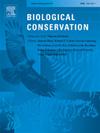增加公众对自然保护支持的证据:荷兰对自然保护态度的15年纵向分析
IF 4.9
1区 环境科学与生态学
Q1 BIODIVERSITY CONSERVATION
引用次数: 0
摘要
解决生物多样性丧失根源的变革关键取决于公众对社会、文化、经济和政治变革的支持。公众在这一过程中起着核心作用,因为它影响着消费者需求、投票行为和管理行为。基于15年(2006-2021年;N = 7037),本文报告了荷兰公众对自然保护态度的纵向发展。分析表明,公众对自然保护和国家保护政策的支持率普遍很高,而且还在上升。与此同时,我们发现了“态度-优先级差距”,即支持保护的态度不会导致保护优先于其他政策问题,如医疗保健或失业。此外,自然的形象也发生了变化,越来越多的人支持以荒野为导向的保护,而不是更有管理的自然。聚类分析确定了社会上四个不同的群体。具有强烈环保态度的群体表现出更多的环保行为,包括绿色消费主义、管理志愿服务和行动主义。最不支持的群体尤其批评扩大自然区域以及严格保护稀有和濒危物种,因为他们认为这可能会限制经济发展。虽然社会上的批评声音需要得到认可,但本文中报道的普遍较高的公众支持也可以对保护主义者、政策制定者和非政府组织有利,帮助他们制定扭转生物多样性丧失的雄心,并考虑到社会中所有相关利益相关者的态度和看法。本文章由计算机程序翻译,如有差异,请以英文原文为准。
Evidence for increasing public support for nature conservation: A 15-year longitudinal analysis of nature conservation attitudes in the Netherlands
Transformative change to address the root causes of biodiversity loss critically depends on public support for social, cultural, economic and political change. The general public plays a central role in this process as it influences consumer demand, voting behavior, and stewardship actions. Based on a unique time series of representative quantitative surveys conducted over 15 years (2006–2021; N = 7037), this paper reports on the longitudinal development of attitudes towards nature conservation of the general public in the Netherlands. Analysis shows that public support for nature conservation and for national conservation policies is generally high and rising. Meanwhile, we find an “attitude-priority gap”, where pro-conservation attitudes do not result in prioritizing conservation over other policy issues, such as health care or unemployment. In addition, images of nature change, with increasing support for wilderness-oriented conservation over more managed nature. Cluster analysis identified four distinct groups in society. Groups with strong pro-conservation attitudes show significant more pro-conservation behaviors, including green consumerism, stewardship volunteering and activism. The least supportive group especially criticizes the expansion of natural areas as well as the strict protection of rare and endangered species, because they feel this may limit economic development. While critical voices in society need to be recognized, the generally high public support reported in this paper can also be of benefit to conservationists, policymakers and NGOs in the framing of their ambitions to revers biodiversity loss and taking into account attitudes and perceptions of all relevant stakeholders in society.
求助全文
通过发布文献求助,成功后即可免费获取论文全文。
去求助
来源期刊

Biological Conservation
环境科学-环境科学
CiteScore
10.20
自引率
3.40%
发文量
295
审稿时长
61 days
期刊介绍:
Biological Conservation is an international leading journal in the discipline of conservation biology. The journal publishes articles spanning a diverse range of fields that contribute to the biological, sociological, and economic dimensions of conservation and natural resource management. The primary aim of Biological Conservation is the publication of high-quality papers that advance the science and practice of conservation, or which demonstrate the application of conservation principles for natural resource management and policy. Therefore it will be of interest to a broad international readership.
 求助内容:
求助内容: 应助结果提醒方式:
应助结果提醒方式:


